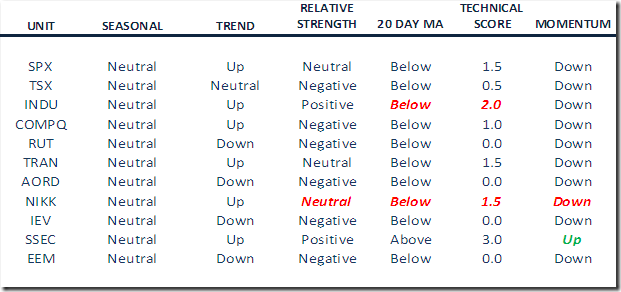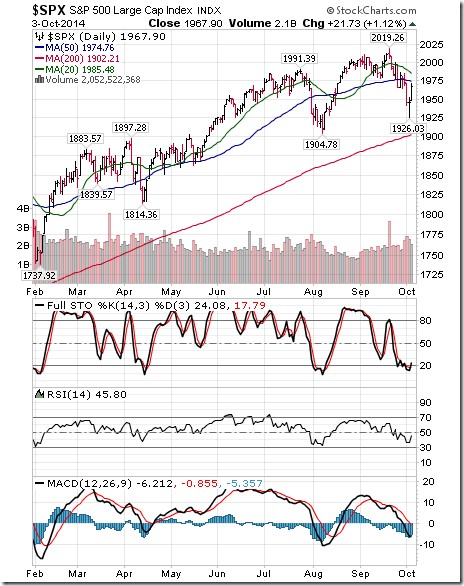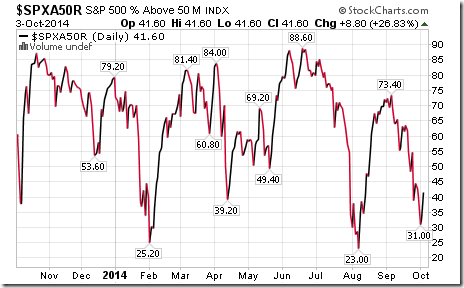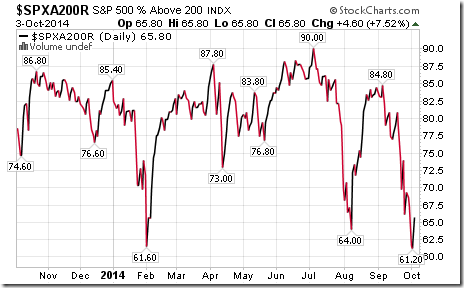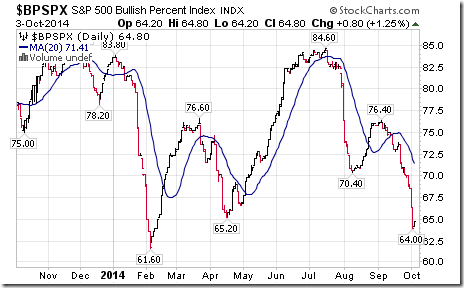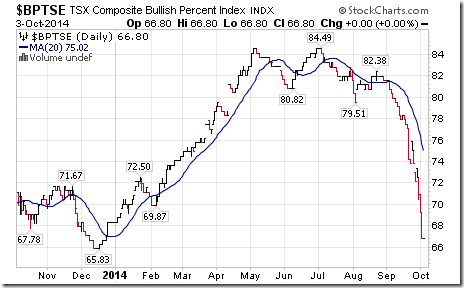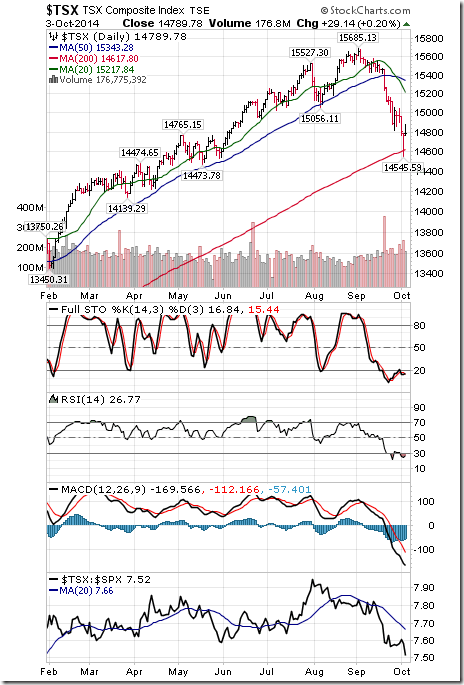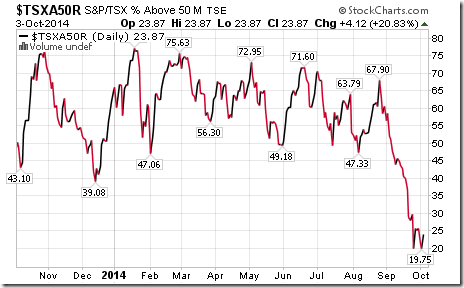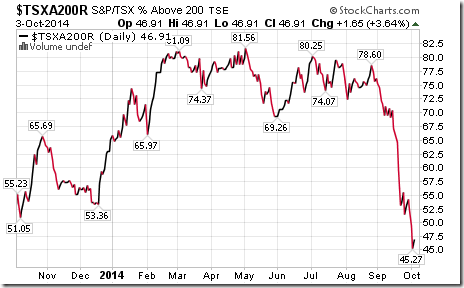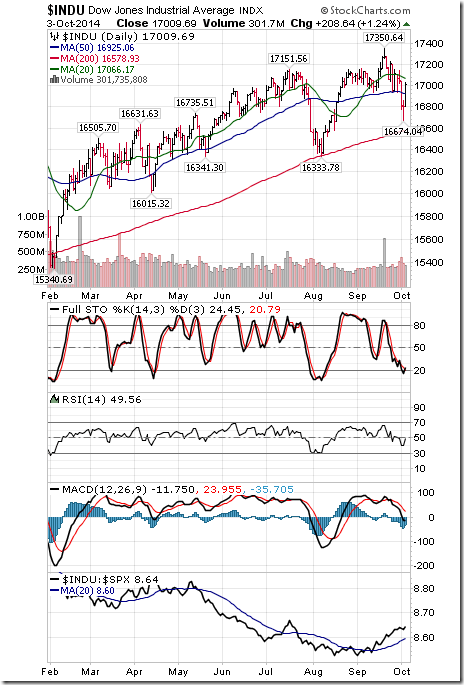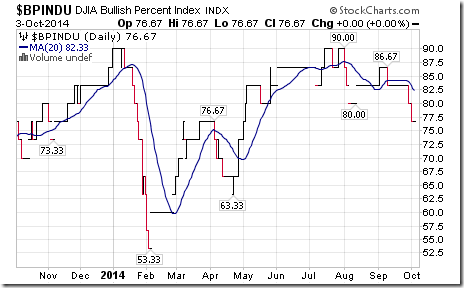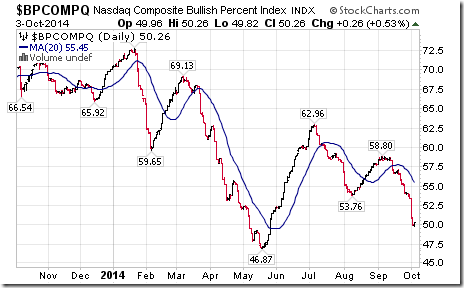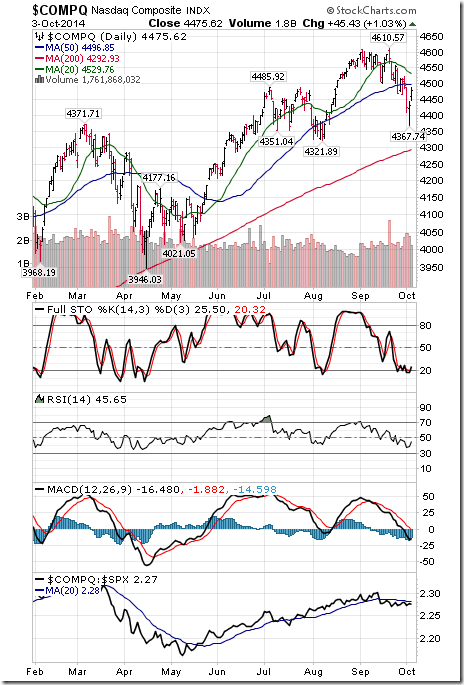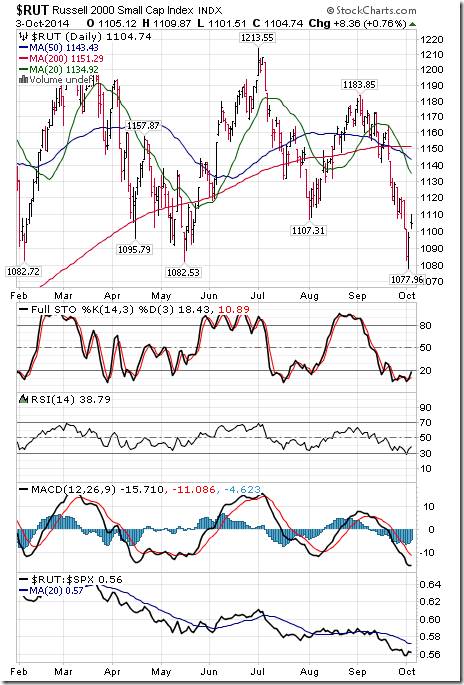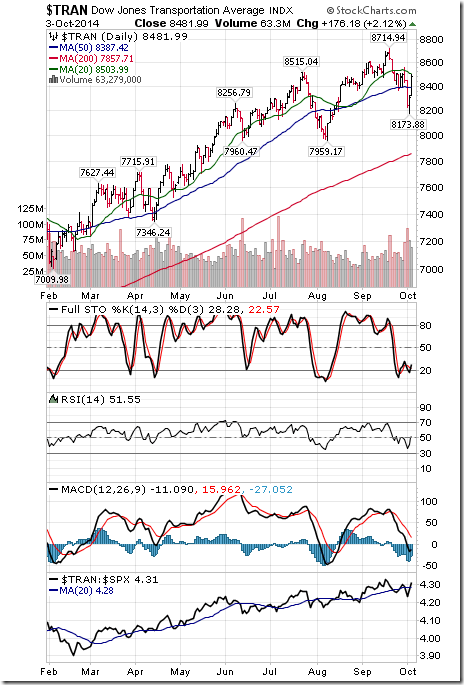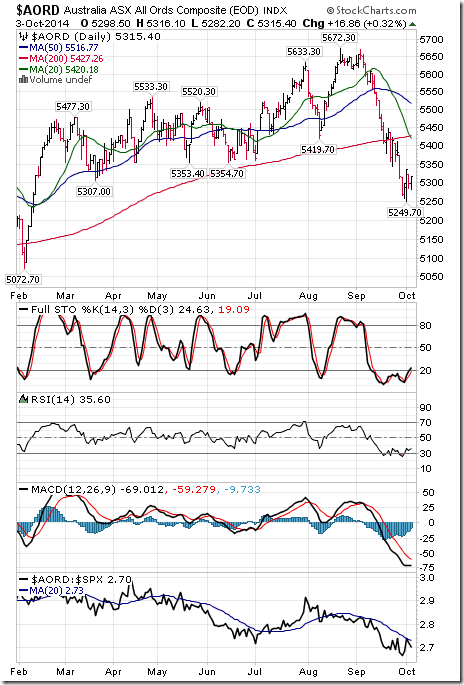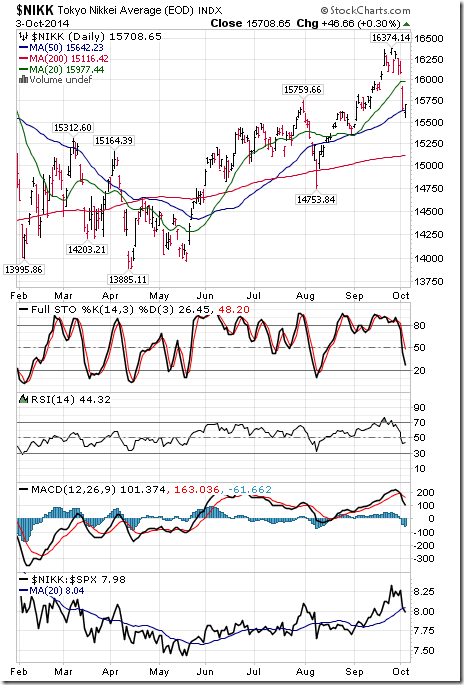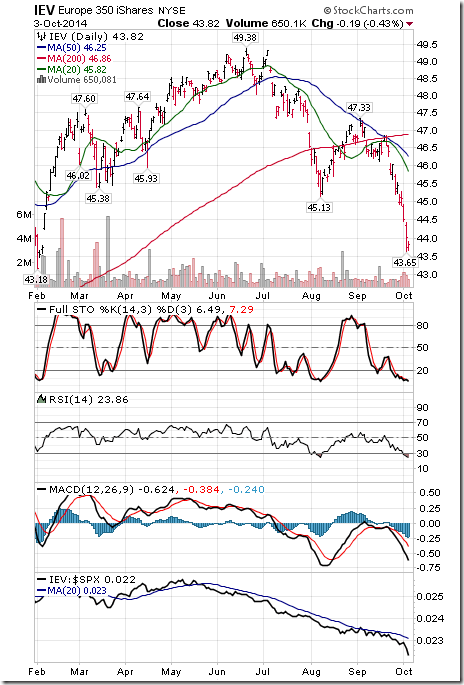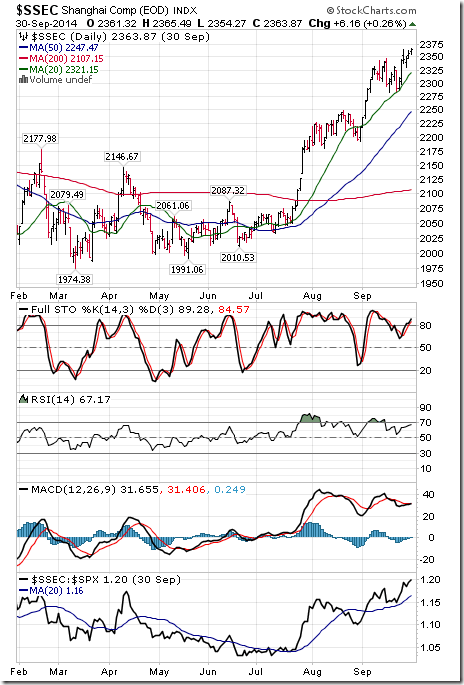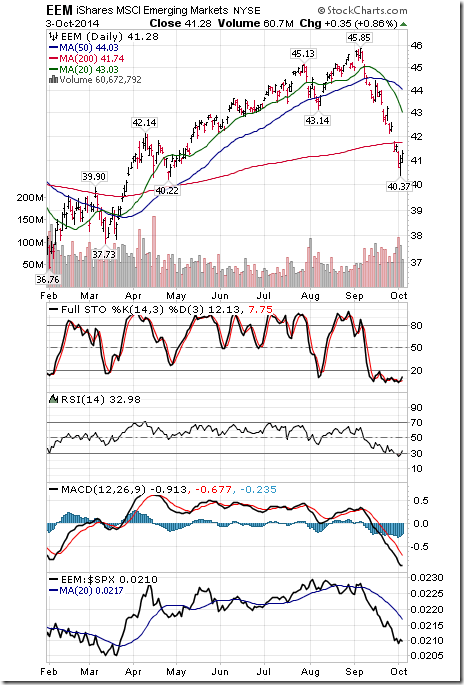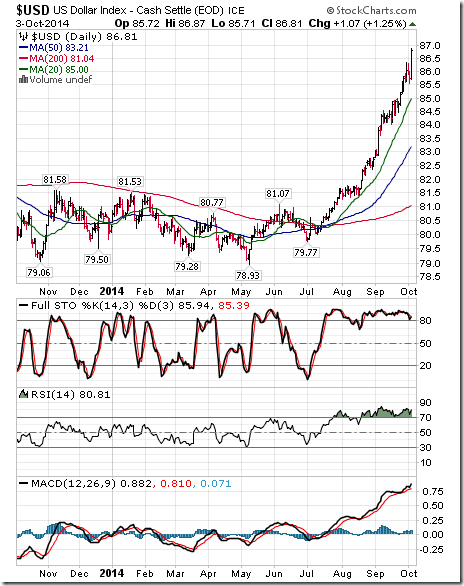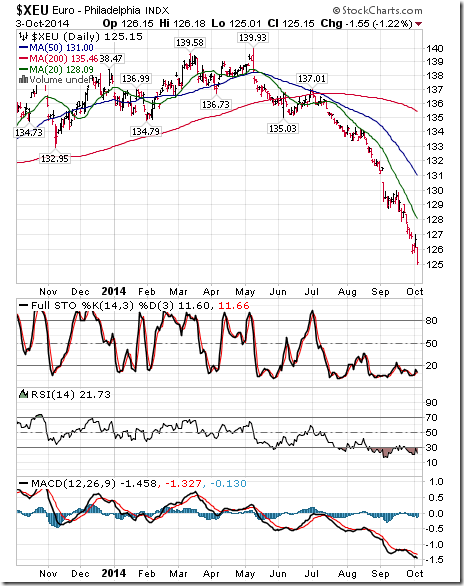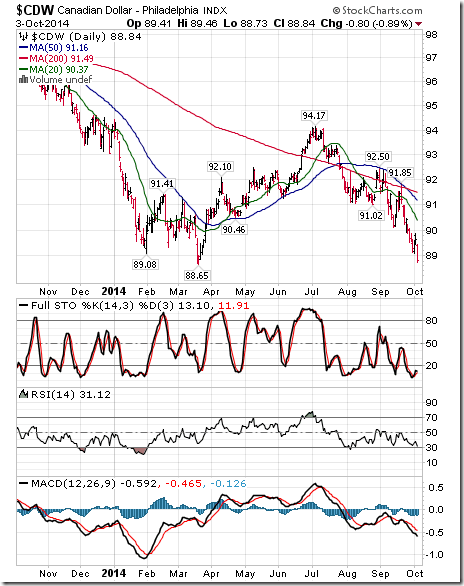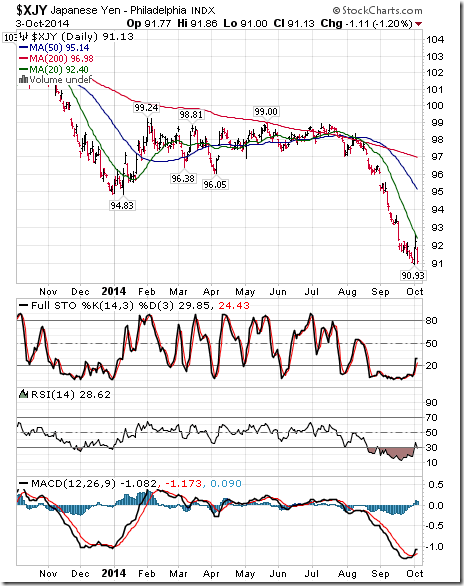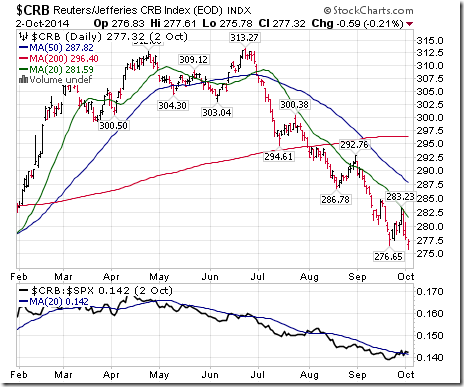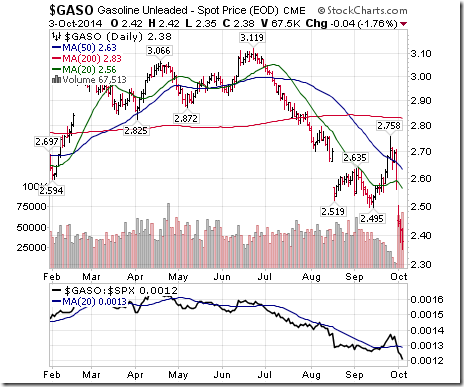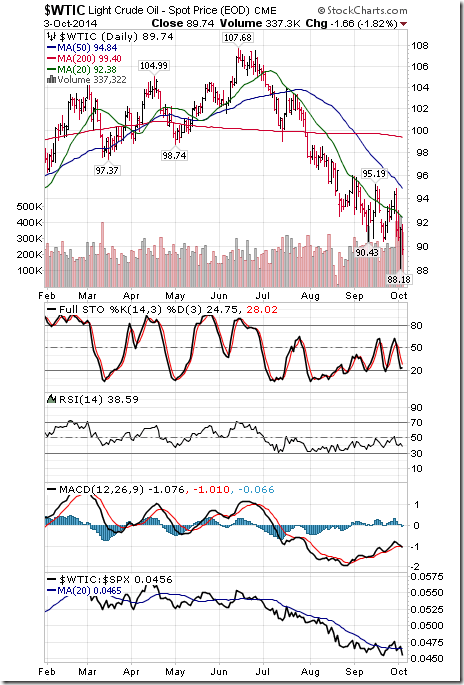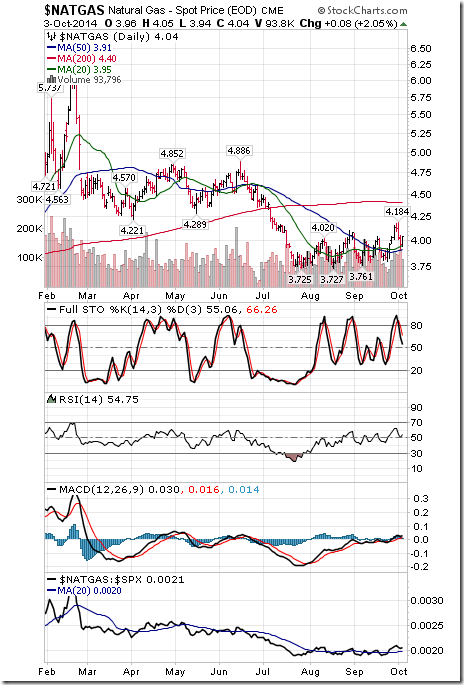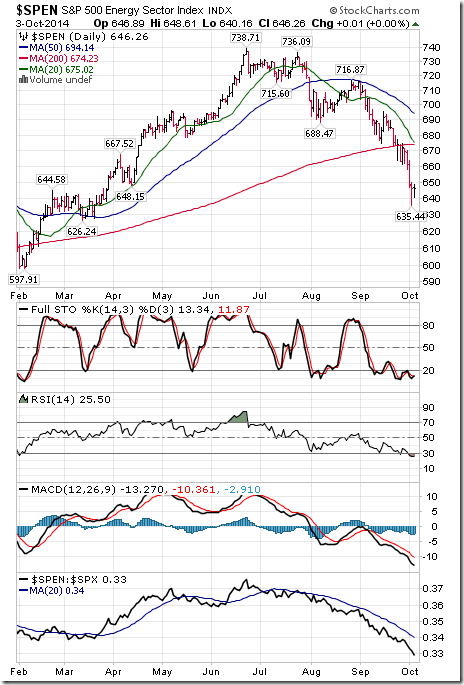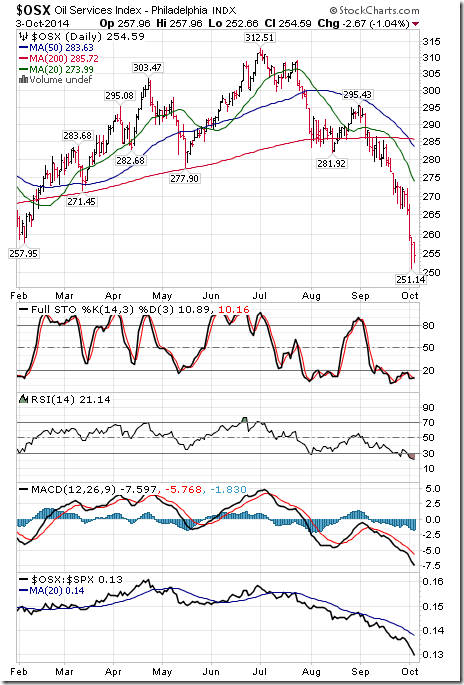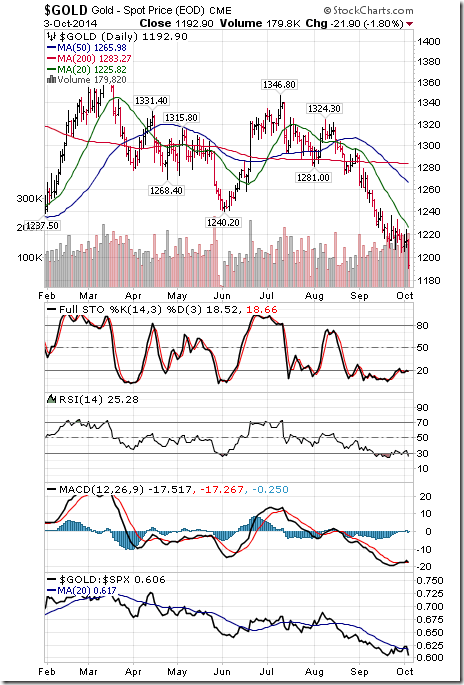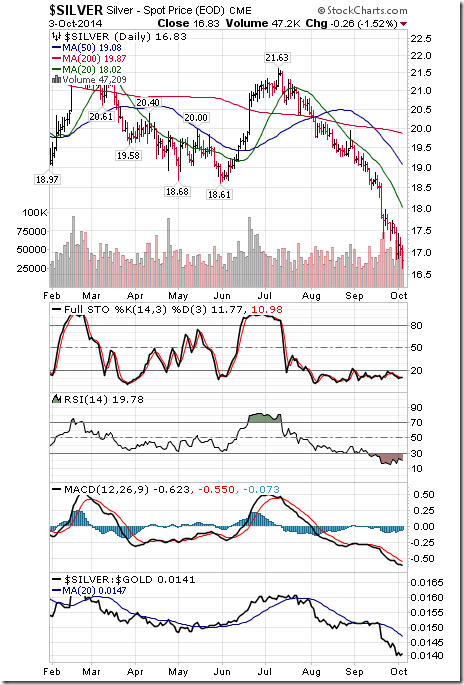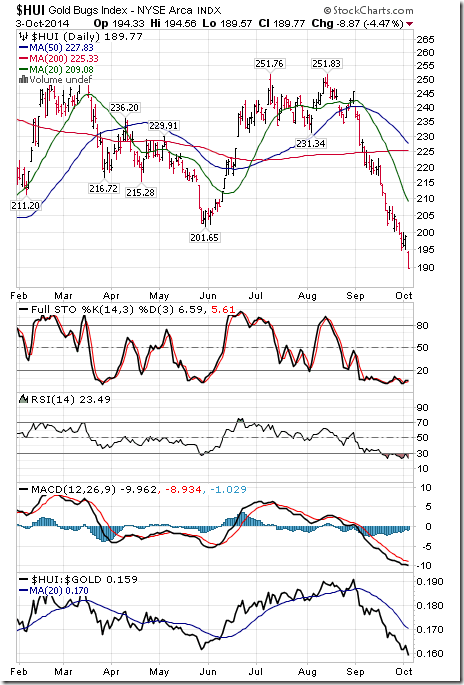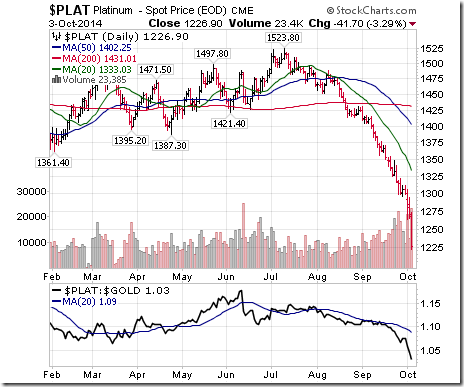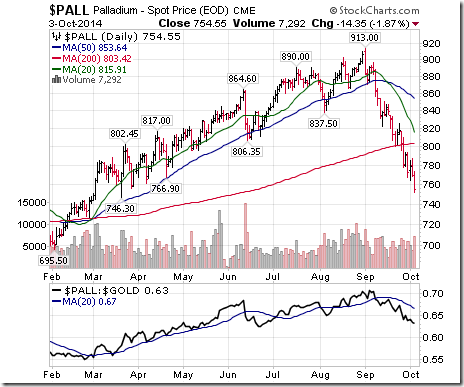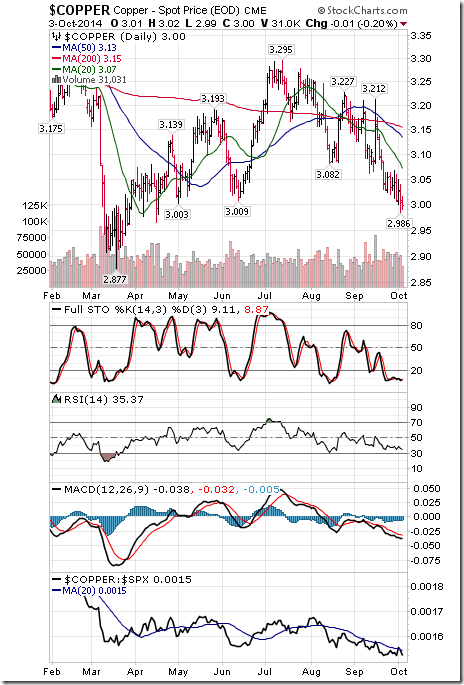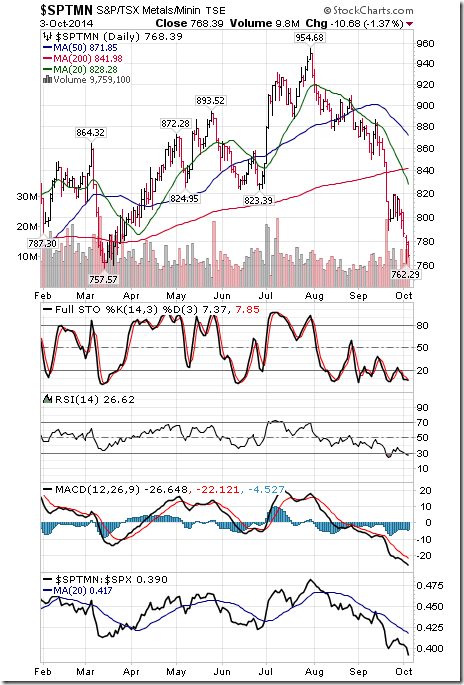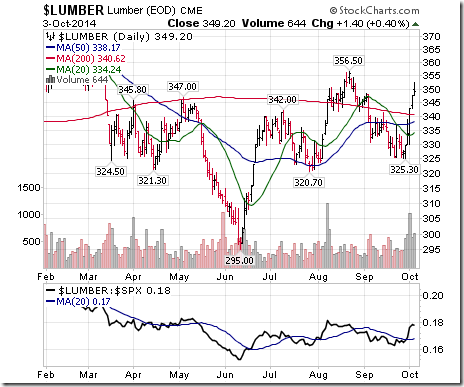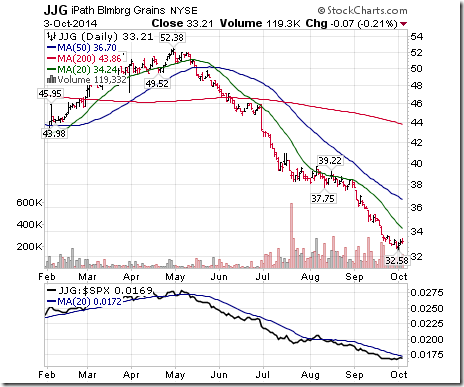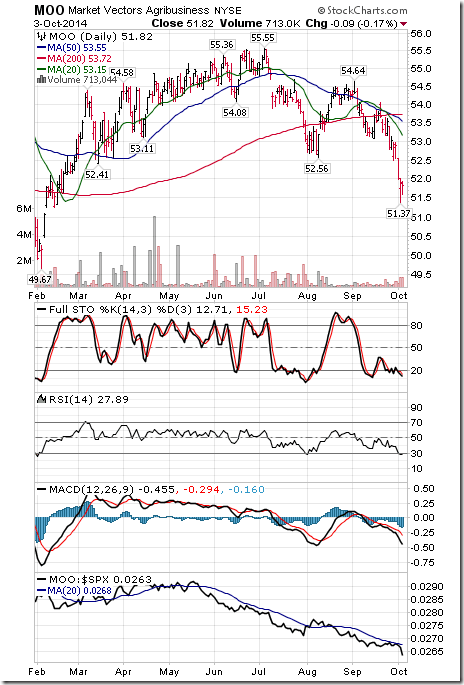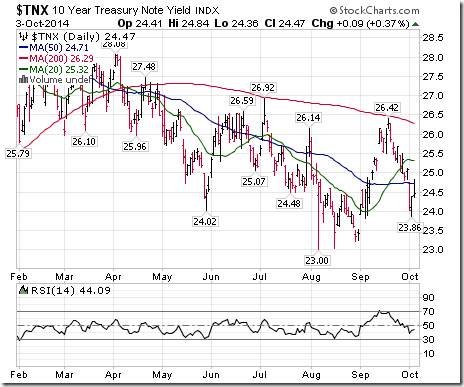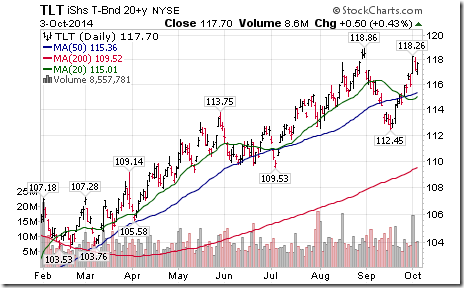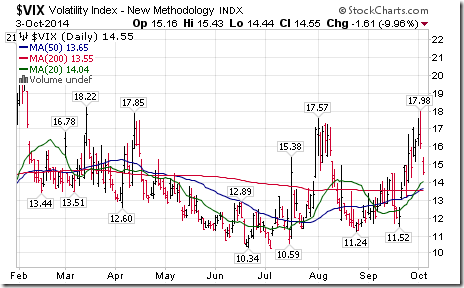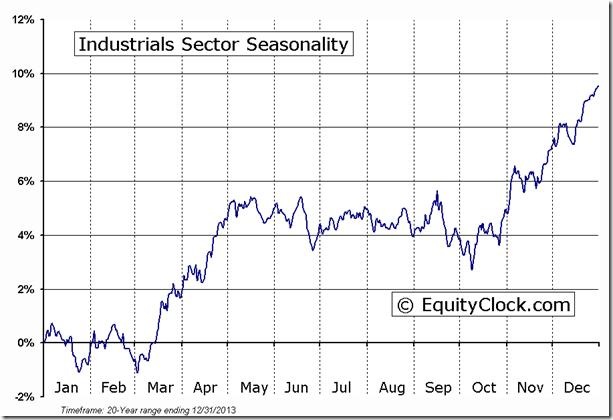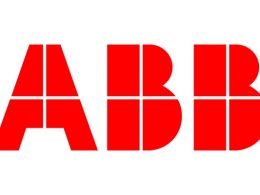by Don Vialoux, Timingthemarket.ca
Pre-opening Comments for Monday October 6th
U.S equity index futures were higher this morning. S&P 500 futures were up 8 points in pre-opening trade.
Hewlett Packard gained $2.12 to $37.32 after announcing plans to split the company into two separate public companies.
Becton Dickenson added $9.69 to $125.53 after JP Morgan upgraded the stock from Underweight to Neutral. Target is $115.
Harley Davidson gained $0.71 to $60.10 after RBC Capital upgraded the stock from Sector Perform to Outperform. Target is $70.
Burger King added $0.59 to $30.67 after Morgan Stanley upgraded the stock from Equal Weight to Overweight. Target is $38.
Intuitive Surgical gained $11.84 to $485.05 after Goldman Sachs upgraded the stock from Neutral to Buy. Target is $584.
McDonalds dipped $0.54 to $94.32 after Morgan Stanley downgraded the stock from Overweight to Equal Weight. Target is $96.
Oracle added $0.26 to $39.03 after DA Davidson upgraded the stock from Neutral to Buy. Target is $47.
EquityClock.com’s Daily Market Comment
Following is a link:
http://www.equityclock.com/2014/10/05/stock-market-outlook-for-october-6-2014/
Note comments on S&P stocks entering their period of seasonal strength.
Economic News This Week
Canadian September Housing Starts to be released at 8:15 AM EDT on Wednesday are expected to increase to 197,500 from 192,400 in August
FOMC Meeting Minutes for September 17th meeting are released on Wednesday at 2:00 PM EDT
Weekly Initial Jobless Claims to be released at 8:30 AM EDT on Thursday are expected to increase to 300,000 from 287,000 last week.
August Wholesale Inventories to be released at 10:00 AM EDT on Thursday are expected to increase 0.3% versus a gain of 0.1% in July.
Canadian September Unemployment Rate to be released at 8:30 AM EDT on Friday is expected to remain at 7.0% set in August. Canadian September Net Change in Employment is expected to increase 20,000 versus a decline of 11,000 in August.
Earnings News This Week
Tuesday: Yum Brands
Wednesday: Alcoa, Costco, Monsanto, Safeway
Thursday: Family Dollar, Pepsico
Summary of Weekly Seasonal/Technical Parameters for Equity Indices/ETFs
Key:
Seasonal: Positive, Negative or Neutral on a relative basis applying EquityClock.com charts
Trend: Up, Down or Neutral
Strength relative to the S&P 500 Index: Positive, Negative or Neutral
Momentum based on an average of Stochastics, RSI and MACD: Up, Down or Mixed
Twenty Day Moving Average: Above, Below
Green: Upgrade or higher
Red: Downgrade or lower
The S&P 500 Index fell 14.95 points (0.75%) last week. Intermediate trend remains up. The Index remains below its 20 day moving average. Short term momentum indicators are trending down, but are deeply oversold.
Percent of S&P 500 stocks trading above their 50 day moving average slipped last week to 41.60% from 44.40%. Percent continues to trend down despite the gain on Friday.
Percent of S&P 500 stocks trading above their 200 day moving average dropped last week to 65.80% from 69.40%. Percent continues to trend down.
Bullish Percent Index for S&P 500 stocks dropped last week to 64.80% form70.00% and remained below its 20 day moving average. The Index remains intermediate overbought and trending down.
Bullish Percent Index for TSX Composite stocks plunged to 66.80% from 72.13% and remains below its 20 day moving average. The Index remains intermediate overbought and trending down.
The TSX Composite Index plunge 236.99 points (1.58%) last week. Intermediate trend remains neutral (Score: 0.5). The Index remains below its 20 day moving average (Score 1.0). Strength relative to the S&P 500 Index remains negative (Score: 0.0). Technical score based on the above three indicators remains at 0.5 out of 3.0. Short term momentum indicators are trending down, but are deeply oversold.
Percent of TSX stocks trading above its 50 day moving average slipped last week to 23.87% from 25.51%. Intermediate trend remains down. Percent has reached a level where bottoming frequently occurs.
Percent of TSX stocks trading above their 200 day moving average plunged last week to 46.91% from 53.09%. Percent continues to trend down.
The Dow Jones Industrial Average dropped 103.46 points (0.60%) last week. Intermediate trend remains up. The Average fell below its 20 day moving average. Strength relative to the S&P 500 Index remains positive. Technical score slipped to 2.0 from 3.0 out of 3.0. Short term momentum indicators are trending down, but are deeply oversold.
Bullish Percent Index for Dow Jones Industrial Average stocks fell last week to 76.67% from 83.33% and remained below its 20 day moving average. The Index remains intermediate overbought and trending down.
Bullish Percent Index for NASDAQ Composite stocks dropped last week to 50.26% from 54.05%. The Index remains intermediate overbought and trending down.
The NASDAQ Composite Index lost 36.57 points (0.81%) last week. Intermediate trend remains up. The Index remains below its 20 day moving average. Strength relative to the S&P 500 Index remains negative. Technical score remains at 1.0 out of 3.0.Short term momentum indicators are trending down and are deeply oversold.
The Russell 2000 Index dropped another 14.59 points (1.30%) last week. Intermediate trend remains down. The Index remains below its 20 day moving average. Strength relative to the S&P 500 Index remains negative. Technical score remains at 0.0 out of 3.0. Short term momentum indicators are trending down, but are deeply oversold and showing early signs of bottoming.
The Dow Jones Transportation Average fell 2.92 points (0.03%) last week. Intermediate trend remains up. The Average remains below its 20 day moving average. Strength relative to the S&P 500 Index remains neutral. Technical score remains at 1.5 out of 3.0. Short term momentum indicators are trending down and are deeply oversold.
The Australia All Ordinaries Composite Index slipped 1.20 points (0.02%) last week. Intermediate trend remains down. The Index remains below its 20 day moving average. Strength relative to the S&P 500 Index remains negative. Technical score remains at 0.0 out of 3.0. Short term momentum indicators are trending down but are deeply oversold and showing early signs of bottoming.
The Nikkei Average plunged 521.21 points (3.21%) last week. Intermediate trend remains up. The Average fell below its 20 day moving average. Strength relative to the S&P 500 Index changed to neutral from positive. Technical score fell to 1.5 from 3.0 out of 3.0. Short term momentum indicators are trending down.
iShares 350 units plunged $1.63 (3.69%) last week. Intermediate trend remains down. Units remain below their 20 day moving average. Strength relative to the S&P 500 Index remains negative. Technical score remains at 0.0 out of 3.0. Short term momentum indicators are trending down and are deeply oversold.
The Shanghai Composite Index added 16.15 points (0.69%) in two days of trading. No trading occurred on Wednesday, Thursday and Friday due to holidays. Intermediate trend remains up. The Index remains above its 20 day moving average. Strength relative to the S&P 500 Index remains positive. Technical score remains at 3.0 out of 3.0. Short term momentum indicators are trending up.
iShares Emerging Markets plunged $1.14 (2.69%) last week. Intermediate trend remains down. Units remain below their 20 day moving average. Strength relative to the S&P 500 Index remains negative. Technical score remains at 0.0 out of 3.0. Short term momentum indicators are trending down, but are deeply oversold.
Currencies
The U.S. Dollar Index remains parabolic. It gained another 1.06 (1.24%) last week. Intermediate trend remains up. The Index remains above its 20 day moving average. Short term momentum indicators are trending up, but are deeply overbought.
The Euro dropped another 1.71 (1.34%) last week. Intermediate trend remains down. The Euro remains below its 20 day moving average. Short term momentum indicators are trending down, but are deeply oversold.
The Canadian Dollar fell another 0.82 (0.92%) last week. Intermediate trend remains down. The Canuck Buck remains below its 20 day moving average. Short term momentum indicators are trending down, but are deeply oversold.
The Japanese Yen fell another 0.37 (0.40%) last week. Intermediate trend remains down. The Yen remains below its 20 day moving average. Short term momentum indicators are deeply oversold and showing early signs of bottoming.
Commodities
The CRB Index fell 2.96 points (1.06%) last week. Intermediate trend remains down. The Index remains below its 20 day moving average. Strength relative to the S&P 500 Index changed to neutral from negative. Technical score improved to 0.5 from 0.0 out of 3.0.
Gasoline plunged $0.28 per gallon (10.53%) last week. Intermediate trend changed to down to neutral on a move below $2.495. Gasoline moved below its 20 day moving average. Strength relative to the S&P 500 Index changed to negative from positive. Technical score changed to 0.0 from 2.5 out of 3.0.
Crude Oil plunged $3.80 per barrel (4.06%) last week. Intermediate trend remains down. Crude fell below its 20 day moving average. Strength relative to the S&P 500 Index changed to negative from neutral. Technical score fell to 0.0 from 1.5 out of 3.0. Short term momentum indicators are mixed.
Natural Gas added $0.06 per MBtu (1.51%) last week. Intermediate trend remains up. “Natty” remains above its 20 day moving average. Strength relative to the S&P 500 Index changed to positive from neutral. Technical score improved to 3.0 from 2.5 out of 3.0.
The S&P Energy Index plunged 25.69 points (3.82%) last week. Intermediate trend remains down. The Index remains below its 20 day moving average. Strength relative to the S&P 500 Index remains negative. Technical score remains at 0.0 out of 3.0. Short term momentum indicators are trending down, but are deeply oversold.
The Philadelphia Oil Services Index plunged17.18 points (6.32%) last week. Intermediate trend remains down. The Index remains below its 20 day moving average. Strength relative to the S&P 500 Index remains negative. Technical score remains at 0.0 out of 3.0. Short term momentum indicators are trending down, but are deeply oversold.
Gold lost another $22.50 per ounce (1.85%) last week. Intermediate trend remains down. Gold remains below its 20 day moving average. Strength relative to the S&P 500 Index remains negative. Technical score remains at 0.0 out of 3.0. Short term momentum indicators are trending down, but are deeply oversold and showing early signs of bottoming.
Silver dropped another $0.71 per ounce (4.05%) last week. Intermediate trend remains down. Silver remains below its 20 day moving average. Silver remains below its 20 day moving average. Strength relative to Gold and the S&P 500 Index remains negative. Technical score remains at 0.0 out of 3.0. Short term momentum indicators are trending down, but are deeply oversold.
The AMEX Gold Bug Index plunged another 11.92 points (5.91%) last week. Intermediate trend remains down. The Index remains below its 20 day moving average. Strength relative to the S&P 500 Index and Gold remains negative. Technical score remains at 0.0 out of 3.0. Short term momentum indicators are trending down, but are deeply oversold.
Platinum plunged another $76.10 per ounce (5.77%) last week. Trend remains down. PLAT remains below its 20 day MA. Strength relative to the S&P and Gold remains negative.
Palladium dropped another $28.25 per ounce (3.73%) last week. Intermediate trend remains down. PALL remains below its 20 day moving average. Strength relative to the S&P 500 Index and Gold remains negative. Technical score remains at 0.0 out of 3.0.
Copper dropped another $0.04 per lb. (1.32%) last week. Intermediate trend remains down. Copper remains below its 20 day moving average. Strength relative to the S&P 500 Index remains negative. Technical score remains at 0.0 out of 3.0. Short term momentum indicators are trending down, but are oversold.
The TSX Metals & Mining Index plunged 47.28 points (5.80%) last week Intermediate trend remains down. The Index remains below its 20 day moving average. Strength relative to the S&P 500 Index remains negative. Technical score remains at 0.0 out of 3.0. Short term momentum indicators are trending down, but are deeply oversold.
Lumber gained $22.00 (6.72%) last week. Intermediate trend changed to neutral from down. Lumber moved above its 20 day moving average. Strength relative to S&P changed to positive.
The Grain ETN added $0.24 (0.73%) last week. Intermediate trend remains down. Units remain below their 20 day moving average. Strength relative to the S&P 500 changed to neutral from negative. Technical score improved to 0.5 from 0.0 out of 3.0.
The Agriculture ETF dropped another $1.21 (2.28%) last week. Intermediate trend remains down. Units remain below their 20 day moving average. Strength relative to the S&P 500 Index remains negative. Technical score remains at 0.0 out of 3.0. Short term momentum indicators are trending down, but are deeply oversold.
Interest Rates
The yield on 10 year Treasuries fell 8.8 basis points (3.47%) last week. Intermediate trend remains up. Yield fell below its 20 day moving average. Short term momentum indicators are trending down.
Conversely, price of the long term Treasury ETF added $1.70 (1.47%) last week. Intermediate trend remains up. Price remains above its 20 day moving average.
Other Issues
The VIX Index spiked as high as 17.98% on Thursday, but fell sharply on Friday to close down 0.30 (2.02%) last week.
Strength in the U.S. Dollar dominates the technical action by equity markets around the world. The U.S. Dollar Index is substantially overbought (i.e. gone parabolic), but has yet to show signs of peaking.
Third quarter earnings reports start to be released this week. Consensus earnings estimate for Dow Jones Industrial Average companies is a gain on average (median) of approximately 4% on a year-over-year basis. However, estimates may be high due to strength in the U.S. Dollar. Consensus earnings estimate for TSX 60 companies is a more robust gain of 10.4%. Watch out for negative third quarter and annual guidance by selected companies who claim a negative impact caused by strength in the U.S. Dollar
Seasonal influences between now and the end of October turn from negative to positive. Typically, North American equity markets go through a bottoming process prior to developing a new intermediate uptrend. The bottoming process tends to occur earlier than usual during mid-term Presidential cycle years such as 2014. Historically, bottom of the four year Presidential Cycle occurs in October in a mid-term U.S. election year.
Short and intermediate technical indicators are deeply oversold and showed early signs of recovery on Friday. Nice bounce by the S&P 500 Index on Friday from near its 125 day moving average.
Economic news this week is not a factor.
International events (Ukraine, Palestine, Iraq, Syria, Libya, Hong Kong) remain a focus for equity markets.
The Bottom Line
Look for equity market to start a bottoming process that eventually will provide a buying opportunity. It’s too early to make a major commitment, but planning for equity purchases when the bottoming process becomes apparent makes sense. Economic sensitive equities and related ETFs (Industrials, Materials, Technology, Consumer Discretionary) will provide a clue. They normally are the first sectors to move higher each fall.
Note that trading profits were taken at the open on Friday in the five Monitored Technical/Seasonal Trade Ideas that were recommended as a Sell/Short
Special Free Services available through www.equityclock.com
Equityclock.com is offering free access to a data base showing seasonal studies on individual stocks and sectors. The data base holds seasonality studies on over 1000 big and moderate cap securities and indices. To login, simply go to http://www.equityclock.com/charts/
Following is an example:
INDUSTRIAL Relative to the S&P 500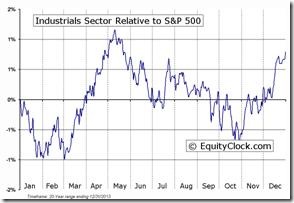 |
Monitored Technical/Seasonal Trade Ideas
A security must have a Technical Score of 1.5 – 3.0 to be on this list.
Green: Increased Technical Score
Red: Reduced Technical Score
Disclaimer: Comments, charts and opinions offered in this report by www.timingthemarket.ca and www.equityclock.com are for information only. They should not be considered as advice to purchase or to sell mentioned securities. Data offered in this report is believed to be accurate, but is not guaranteed. Don and Jon Vialoux are Research Analysts with Horizons ETFs Management (Canada) Inc. All of the views expressed herein are the personal views of the authors and are not necessarily the views of Horizons ETFs Management (Canada) Inc., although any of the recommendations found herein may be reflected in positions or transactions in the various client portfolios managed by Horizons ETFs Management (Canada) Inc.
Individual equities mentioned in StockTwits are not held personally or in HAC.
Horizons Seasonal Rotation ETF HAC October 3rd 2014
Copyright © Timingthemarket.ca






